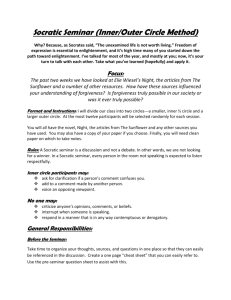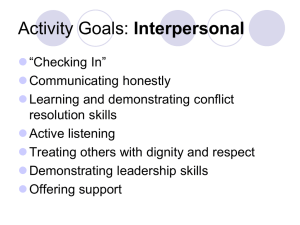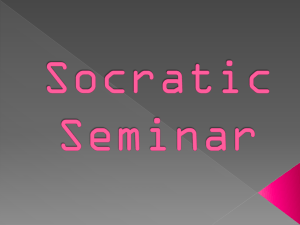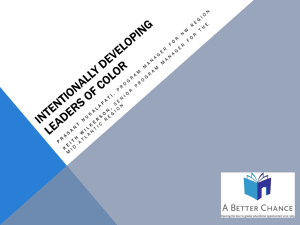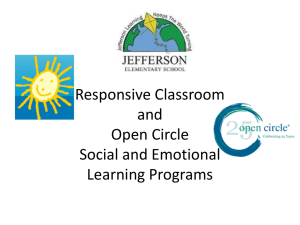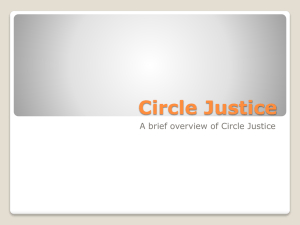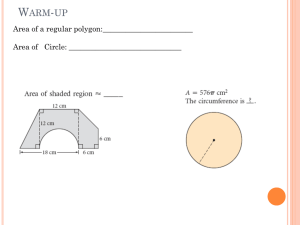Socratic Seminar PowerPoint
advertisement
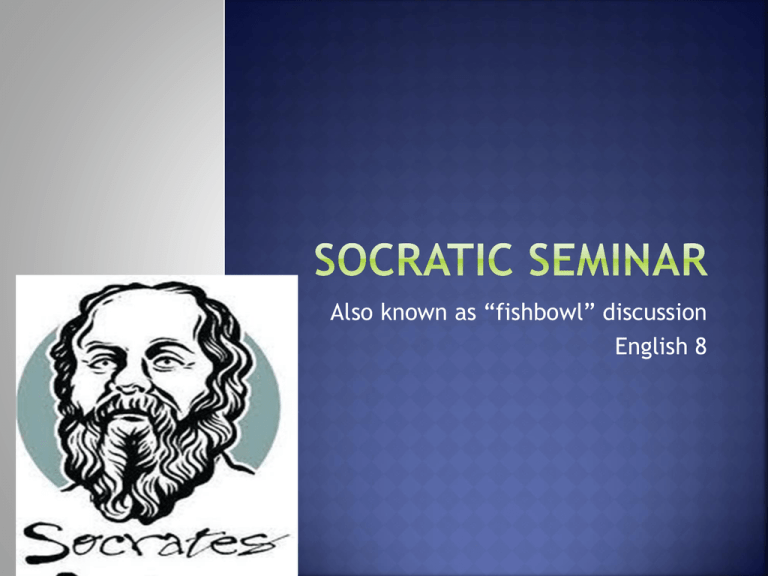
Also known as “fishbowl” discussion English 8 I can participate in a discussion by posing questions that connect the ideas of several speakers. I can make relevant observations and use my ideas and comments to further the discussion. A Socratic seminar is a ‘collaborative, intellectual dialogue facilitated with openended questions about a text.’ - The National Paideia Center, which has developed extensive material on using seminars in classrooms Socrates, a classic Greek philosopher, was convinced the surest way to attain reliable knowledge was through the practice of disciplined conversation. He believed in examining ideas or opinions logically, often by the method of question and answer, to determine their validity. The Socratic method of teaching is based on Socrates’ theory that it is more important to enable students to think for themselves than to fill their heads with the “right” answers. The purpose of a Socratic Seminar is to achieve a deeper understanding about the ideas and values in a text. In the Seminar, participants systematically question and examine issues and principles related to a particular content, and articulate different points-of-view. The group conversation assists participants in constructing meaning through disciplined analysis, interpretation, listening, and discussion. In a Socratic Seminar, the participants carry the burden of responsibility for the quality of the discussion (not the teacher). Good discussions occur when participants study the text closely in advance, listen actively, share their ideas and questions in response to the ideas and questions of others, and search for evidence in the text to support their ideas. The discussion is not about right answers; it is not a debate. Students are encouraged to think out loud and to exchange ideas openly while examining ideas in a rigorous, thoughtful, manner. There are three basic elements of a seminar/fishbowl discussion: Text Classroom Environment Questions All participants read the text in advance. Students are also expected to take active reading notes as they read the text. These notes will help them understand and connect to the text in preparation for the discussion. General classroom rules that need to be followed to make the seminar successful. You must come to discussion prepared, with text read, notes taken and questions prepared, and all these materials readily available during discussion. Don’t raise hands Listen carefully Address one another respectfully Address each other and not teacher Base any opinions on the text No side conversations Use sensitivity to take turns and not interrupt others Be courageous in presenting your own thoughts and reasoning, but be flexible and willing to change your mind in the face of new and compelling evidence The classroom will be set up in an inner and outer circle. Norms for inner circle participants: Students in the inner circle are those who are speaking. Inner circle participants are expected to discuss questions, share answers and opinions, and base these on their text, even pointing out portions of text to their peers in the inner circle. Participants in the inner circle may choose to add to their notes if they hear or learn anything helpful or interesting. All inner circle participants are strongly encouraged to speak at least once during each seminar. Norms for outer circle participants: Student in outer circle are observing and taking notes, but are primarily silent. Students in outer circle may act as “wing men” and help a peer sitting in front of him or her in the inner circle by quietly passing them a note. A “hot seat” will be in place for a student in the outer circle to step forward and briefly become part of the inner circle if the inner circle seems “stuck” or that person feels like they have something very important to add to the conversation. Outer circle participants will add to their notes and record answers for discussion questions. Norms for teacher Teacher will sit in outer circle and record observations, which will result in a summative assessment. Teacher will not lead discussion (or speak much for that matter). Teacher may re-direct discussion or clarify a possible answer, if necessary, or pose another question. Teacher may remind students of the rules. Teacher may share closing observations. Questions will be prepared in advance that will guide the discussion. Students will be given these questions ahead of time and be expected to think about them and include them in their active reading notes. In preparation, students should seek to have answers to the questions, along with evidence (proof) from the story. Initially, the teacher may/will provide the questions, but students may eventually write the questions themselves. Here are some sample questions that you may be asked to be prepared to discuss when assigned reading and active reading notes: What is the main idea or underlying value in the text? What is the author’s purpose or perspective? What does (a particular phrase) mean? What might be a good title for the text? What is the most important word/sentence/paragraph? Here are some questions you may hear the teacher ask during the discussion: Who has a different perspective? Who has not yet had a chance to speak? Where do you find evidence for that in the text? Can you clarify what you mean by that? How does that relate to what (someone else) said? Is there something in the text that is unclear to you? Has anyone changed their mind? Here are some questions you may hear the teacher ask at the end of the discussion: How do the ideas in the text relate to our lives? What do they mean for us personally? Why is this material important? Do you feel like you understand the text at a deeper level? Did you achieve your goals to participate? What was one thing you noticed about the seminar? Notes will be assessed as a formative assessment. Discussion will be assessed as a summative assessment according to the rubric on the next slide. 8.SL.1: Initiate and participate effectively in a range of collaborative discussions (oneon-one, in groups, and teacher-led) with diverse partners on grades 8 topics, texts, and issues, building on others’ ideas and expressing their own clearly and persuasively. Assessment areas Participation in Discussion – Asking questions and provided answers and/or opinions. Thoughtfulness of Comments – Adding input to the discussion by staying on task and supporting responses and opinions with text Respectful – ability to listen and follow the discussion norms 4 100/100 Mastery You asked compelling questions and provided in depth and thoughtful answers and/or opinions that helped others understanding. You thoughtfully referenced the text to support your responses and your input clarified the text for peers. You actively listened, remained open-minded, didn’t interrupt other participants, respected the norms and are a role model for discussion behavior. 3 85/100 Approaching mastery You asked questions and provided answers and/or opinions that added to others understanding during discussion. 2 75/100 Proficient 1 1/100 Basic You asked questions and provided answers and/or opinions. You did not ask questions or provide answers and/or opinions. You referenced the text often to support your responses and enrich the discussion. You referenced back to the text to support your responses. You did not reference the text to support your responses. You actively listened, remained open-minded, didn’t interrupt other participants and respected the norms. You listened, remained openminded, didn’t interrupt other participants and respected the norms. You did not listen and did not follow the classroom norms for discussion such as interrupting, having side conversation during discussion, etc. http://www.youtube.com/watch?v=QxZMGK6 IdEs&feature=player_detailpage http://www.youtube.com/watch?v=6pGVR6Z F_2M&list=PL2Bc1IDY9g8M98Kynqzp88nvTI1Wjdej&feature=player_detailpage “A Socratic discussion is a text-based discussion in which an individual sets their own interpretations of the text alongside those of other participants. The aim is a mutual search for a clearer, wider and deeper (‘enlarged’) understanding of the ideas, issues, and values in the text at hand. It is shared inquiry, not debate; there is no opponent save the perplexity all persons face when they try to understand something that is both difficult and important.” — Walter Parker, PhD, University of Washington www.readthinkwrite.org www.gpisd.org/ http://nwabr.org/sites/default/files/SocSem .pdf

